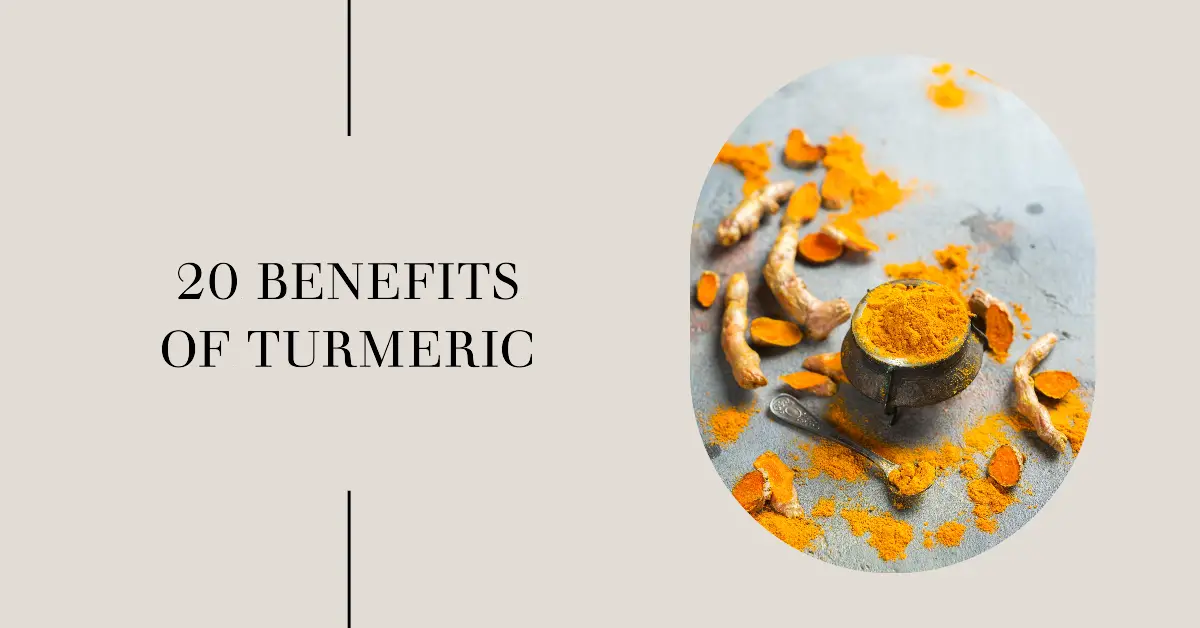
Turmeric is a popular spice that has been used in traditional medicine for centuries. It is known for its bright yellow color and its distinctive flavor. Turmeric is also rich in curcumin, a compound that has been shown to have a wide range of health benefits.

Here are 20 benefits of turmeric, backed by science:
- Reduces inflammation: Turmeric is a powerful anti-inflammatory spice. Curcumin has been shown to reduce inflammation throughout the body, which can help to improve a variety of health conditions, such as arthritis, heart disease, and cancer.
- Boosts immunity: Turmeric can help to boost immunity by increasing the production of white blood cells. White blood cells help to fight off infection and protect the body from disease.
- Protects against heart disease: Turmeric can help to protect against heart disease by reducing cholesterol levels, preventing blood clots, and improving blood flow.
- Controls blood sugar levels: Turmeric can help to control blood sugar levels by improving insulin sensitivity. This is beneficial for people with diabetes and prediabetes.
- Promotes weight loss: Turmeric can help to promote weight loss by boosting metabolism and reducing fat accumulation.
- Relieves pain: Turmeric can help to relieve pain caused by inflammation, such as arthritis and menstrual cramps.
- Improves brain function: Turmeric can help to improve brain function by protecting against Alzheimer’s disease and other forms of dementia.
- Boosts mood: Turmeric can help to boost mood by increasing serotonin levels in the brain. Serotonin is a neurotransmitter that plays a role in mood regulation.
- Protects against cancer: Turmeric can help to protect against cancer by preventing the growth and spread of cancer cells.
- Improves skin health: Turmeric can help to improve skin health by reducing inflammation, protecting against sun damage, and promoting collagen production.
- Relieves digestive problems: Turmeric can help to relieve digestive problems such as indigestion, heartburn, and diarrhea.
- Improves liver function: Turmeric can help to improve liver function by protecting the liver from damage and promoting detoxification.
- Reduces the risk of kidney stones: Turmeric can help to reduce the risk of kidney stones by preventing the formation of crystals in the urine.
- Protects against eye diseases: Turmeric can help to protect against eye diseases such as macular degeneration and cataracts.
- Reduces the risk of asthma: Turmeric can help to reduce the risk of asthma by reducing inflammation in the airways.
- Relieves menstrual cramps: Turmeric can help to relieve menstrual cramps by reducing inflammation and pain.
- Improves dental health: Turmeric can help to improve dental health by preventing gum disease and tooth decay.
- Boosts athletic performance: Turmeric can help to boost athletic performance by reducing inflammation and improving muscle recovery.
- Protects against infections: Turmeric can help to protect against infections by fighting off bacteria, viruses, and fungi.
- Promotes longevity: Turmeric can help to promote longevity by reducing inflammation and protecting against age-related diseases.
How to Use Turmeric
Turmeric can be used in a variety of ways. It can be added to food, taken as a supplement, or applied topically to the skin.
To add turmeric to food, simply sprinkle it into your favorite dishes. Turmeric can be added to curries, soups, stews, rice, vegetables, and even smoothies.
To take turmeric as a supplement, look for a capsule or powder that contains curcumin. The typical dosage for turmeric supplements is 500-1000 mg per day.
To apply turmeric topically to the skin, mix a small amount of turmeric powder with water to form a paste. Apply the paste to the affected area and leave it on for 15-20 minutes before rinsing it off.
Safety and Side Effects of Turmeric
Turmeric is generally safe for most people to consume. However, it is important to talk to your doctor before taking turmeric supplements, especially if you have any underlying health conditions.
Turmeric can interact with certain medications, such as blood thinners and diabetes medications. It is also important to note that turmeric can cause stomach upset in some people.
Conclusion
Turmeric is a safe and effective spice that offers a wide range of health benefits. It is easy to incorporate into your diet and can be used in a variety of ways. If you are looking for a natural way to improve your health, turmeric is a great option.




